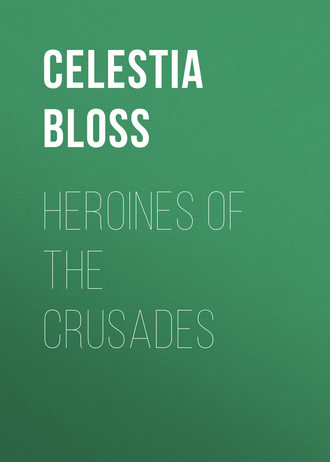 полная версия
полная версияHeroines of the Crusades
“I would have taught him.” – Alphonso, tenth King of Castile who flourished in the 18th century. When contemplating the doctrine of the epicycles, exclaimed, “Were the universe thus constructed, if the deity had called me to his councils at the creation of the world, I would have given him good advice.” He did not however mean any impiety or irreverence, except what was directed against the system of Ptolemy.
Note EEEEE. —Page 425“Motley courtiers.” – Alphonso was not in good repute with his people, either as a Spaniard or a Christian. A great clerk, devoted to the evil sciences of Alchemy and Astrology, he was ever closeted with his Jews, to make spurious money or spurious laws – adulterating the Gothic laws by a mixture of the Roman. —Michelet’s France.
Note FFFFF. —Page 423“Raymond Lullius.” – A story is told of this famous alchemist, that during his stay in London, he changed for King Edward I., a mass of 50,000 pounds of quicksilver into gold, of which the first rose nobles were coined.
Note GGGGG. —Page 433“Everywhere well received.” – The Mendicants strayed everywhere – begged, lived on little, and were everywhere well received. Subtle, eloquent, and able men, they discharged a multiplicity of worldly commissions with discretion. Europe was filled with their activity. Messengers, preachers, and at times diplomatists, they were then what the post and press now are. —Michelet’s France.
Note HHHHH. —Page 435“Slipped a ring.” – Procida offered the ambitious Peter of Arragon, the crown of Sicily, which that monarch might justly claim by his marriage with the daughter of Mainfroy, and by the dying voice of Conradin, who from the scaffold had cast a ring to his heir and avenger. —Gibbon.
Note IIIII. —Page 437“Friar Bacon.” – Though an extraordinary man, could not entirely free himself from the prejudices of his times. He believed in the philosopher’s stone, and in astrology. There are to be found in his writings new and ingenious views on optics, on the refraction of light on the apparent magnitudes of objects, on the magnified appearance of the sun and moon when in the horizon. He also states that thunder and lightning could be imitated by means of saltpetre, sulphur, and charcoal. Hence he had already an idea of gunpowder.
Note JJJJJ. —Page 440“Albertus Magnus.” – During the year 1280, died the celebrated Albert the Great, of the Order of Preaching Friars, less known as a monk than a magician. The prodigious diversity of his learning, and the taste which he had for experiments in alchemy, which he himself called magical operations, caused a superhuman power to be attributed to him. Besides the automaton which St. Thomas de Aquinas, his disciple, broke with a club, it is affirmed that Albert entertained William, Count of Holland, at a miraculous banquet in the garden of his cloister and that though it was in the depth of winter, the trees appeared as in spring, covered with flowers and leaves, which vanished as if by enchantment, after the repast. —History of the Popes.
Note KKKKK. —Page 446“I was anxious.” – This passage is quoted from Falcando, an Italian historian of the twelfth century.
Note LLLLL. —Page 449“Shepherd of Cotswold.” – To Eleanora, is due the credit of introducing the Spanish breed of sheep into England.
Note MMMMM. —Page 452“Red stockings.” – According to Michelet, Procida influenced the pope to sign the treaty with the Greek Emperor, by repeating the insulting allusion of Charles to the purple buskins worn by the pontiff.
Note NNNNN. —Page 453“Easter Monday, 1282.” – The intelligent readers of history will observe an anachronism in placing the Sicilian vespers after the Welsh war. They will also discover a mistake in representing Alphonse as the rival of Conrad, rather than of Rodolph, of Hapsburg, for the crown of the German empire.
Note OOOOO. —Page 454“Rescued.” – Constance of Arragon, fortunately arrived in time to prevent the Sicilians, from putting Charles the Lame to death. She carried him off from Messina in the night and sent him to Spain. When Charles of Arragon was informed of the defeat of his troops, and the captivity of his son, he fell as though struck down by a thunderbolt, and succeeding attacks of epilepsy carried him to the tomb in a few months. Through the mediation of Edward, Charles the Lame, surrendered to Alphonse of Arragon, all claims to the crown of Sicily, and thus gained his liberty. He reigned over Provence in right of his mother, and was the progenitor of Margaret of Anjou.

